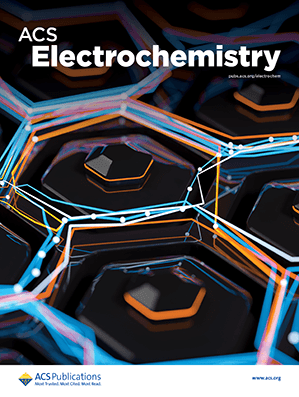Hear from Prof. Unwin as he outlines his vision for the new journal, discusses the importance of electrochemical advancements, and shares advice for young researchers in the field.

Professor Patrick Unwin (University of Warwick, UK) is the founding Editor-in-Chief of ACS Electrochemistry, a new journal which is now open for submissions. In this interview, he shares his vision for the journal, his passion for research, and his thoughts on how young researchers might approach their research.

What does it mean to you to be the founding Editor of ACS Electrochemistry?
It’s a great honor for me to be the founding Editor of ACS Electrochemistry, especially at this time when electrochemistry is of significant interest in so many areas of science. The launch of ACS Electrochemistry could not be more timely! Throughout my career, many of the best papers from my group have been published in ACS journals and our experience has been exceptionally positive. I will take what I have learned as an author, publishing extensively with ACS, into my role as Editor-in-Chief of ACS Electrochemistry.
It’s tremendous that electrochemistry will now have a dedicated home journal with ACS and I am looking forward to leading the development of the journal together with a great team of Associate Editors, Editorial Advisory Board, ACS staff, and the broad electrochemistry community.
What is your vision for ACS Electrochemistry?
Our aim is that ACS Electrochemistry will be the most forward-thinking journal in the field. We hope it will shape and develop the subject, provide the best content, and lead electrochemistry into the future. It is important to me personally that ACS Electrochemistry reflects the values of the present-day electrochemistry community and those engaged in electrochemical research. Prospective authors will already notice that the team of Associate Editors and Editorial Advisory Board are diverse in all aspects—age, gender, race, geography, our interests and the science that we do. I believe we have a team that is strongly in touch with the electrochemistry research community.
I am particularly pleased that alongside established scientists, our Editorial Advisory Board has so many Early Career Researchers, because I see the new generation doing some of the best research in the field, and this group tends to be most in touch with technical advances and is likely to challenge the consensus and shift paradigms.
ACS Electrochemistry will be welcoming, will embrace and lead change, and will be seen as the venue where forefront developments in electrochemistry are considered fairly, reported and discussed. We also have an important role to play in educating the wide scientific community that is engaged in electrochemical research and to lead on best practice.
Why should researchers working in the field consider submitting their next best manuscript to ACS Electrochemistry?
The launch of ACS Electrochemistry by ACS Publications—arguably the most respected and successful publisher in the field of chemistry—signifies to the chemistry community that electrochemistry has come of age as a major sector, recognizing its pivotal role across a wide range of science, from materials science and engineering to the life sciences. ACS journals are widely read and have impact, and I strongly believe that ACS Electrochemistry will become the premier venue for the best in electrochemistry and that a vibrant community of innovative scientists will develop around the journal.
ACS Electrochemistry will be the natural home for articles where electrochemistry is central and we will provide a highly professional experience to authors, from submission to publication. A distinctive feature of ACS journals is the editorial leadership from expert academic Editors, who handle papers, and are supported by the Editorial Advisory Board, who are highly active across the field. The set up at ACS publications means that the editorial team can concentrate on the science, and we shall ensure that manuscripts are handled in a considerate and fair way.
What are you looking for in papers you receive?
First and foremost, we are looking for papers that show a high degree of creativity and offer our readers something new. Electrochemistry and the community are changing, and papers that set forth a new agenda and propose new ideas and concepts are especially welcome. There are many important developments in electrochemistry and we hope to receive papers that capture innovations in instrumentation, data (open data, curation, mining, analysis and presentation), theory and simulations, increasing application of operando methods and hybrid techniques, the combination of experiment and theory, and the integration and appreciation of fundamental and applied aspects of electrochemistry, from materials and energy science to the life sciences.
What excites you about your current research?
It’s exciting to see the ideas and techniques that we have been developing in my group at the University of Warwick taken up by increasing numbers of groups around the world, and to witness a growing community of scientists engaged in nanoelectrochemistry and seeking to understand how electrode structure impacts on activity at the nanoscale. It is becoming possible to connect detailed nanoscale understanding of electrochemical activity through the lengthscales, to provide a multiscale or systems-level view of electrochemical processes, and I expect this is an area that will develop significantly in the future.
The techniques and workflows we have developed, such as scanning electrochemical cell microscopy (SECCM) and correlative electrochemical multimicroscopy (where different co-located microscopy techniques are combined with electrochemical imaging data), provide a platform for the rational discovery and development of new materials and components for electrochemical energy and sensor systems, and deliver major new understanding of electrochemical processes.
I am most proud of the people who have come out of Warwick and our approach to training and development in electrochemistry. We work as a collaborative team, in which students and postdoctoral fellows are empowered and given a large amount of freedom. This has led to some tremendous successes and to large numbers of group members gaining independent academic positions at institutions around the world and in industry.
What advice would you give to young researchers in the field today?
"Young researchers" covers a wide group, from undergraduate and postgraduate students to postdoctoral research fellows and early career professors in universities, as well as scientists doing research in industry, so I would tend to give advice tailored to the circumstance of an individual. However, my overarching suggestion would be to try and maintain a good work-life balance. It’s important to take time out. The best ideas and solutions to problems will often come when having some down-time and fun.
I would also encourage young researchers to be open-minded and receptive to new ideas, share, develop networks (in person and through social media) and read widely (outside your subject area and outside science). Be inspired by both science and the arts!
What about your life outside of research—how do you wind down and relax?
I have wide interests and I have to juggle what I can fit in! I am keen on sport, both participating and watching, and I keep fit with yoga, hiking, running, and cycling. I have strong interests in the arts, especially theatre and music of all kinds.
I am a keen musician myself and enjoy playing live when I get the chance (singing, guitar, piano and keyboard). I like to compose songs and a while ago recorded an entire album in one day to try and emulate my musical heroes – the Beatles – who recorded their first album in record time. I discovered that it’s much easier leading a research group than a band! You can hear our album here.
You can help make ACS Electrochemistry in advancing the best of our discipline by submitting your next paper to the journal. Learn how below.
